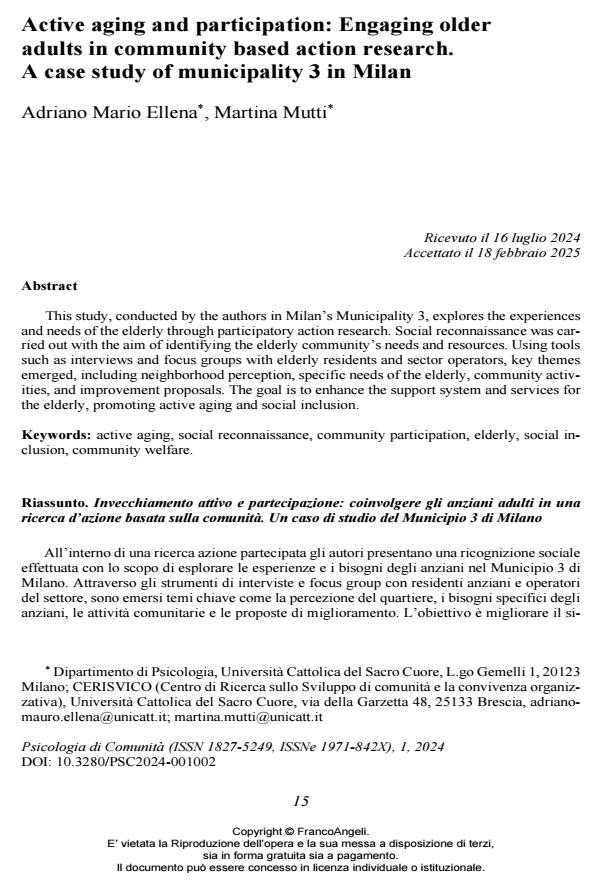Active aging and participation: Engaging older adults in community based action research. A case study of municipality 3 in Milan
Titolo Rivista PSICOLOGIA DI COMUNITA’
Autori/Curatori Adriano Mario Ellena, Martina Mutti
Anno di pubblicazione 2025 Fascicolo 2024/1
Lingua Inglese Numero pagine 18 P. 15-32 Dimensione file 124 KB
DOI 10.3280/PSC2024-001002
Il DOI è il codice a barre della proprietà intellettuale: per saperne di più
clicca qui
Qui sotto puoi vedere in anteprima la prima pagina di questo articolo.
Se questo articolo ti interessa, lo puoi acquistare (e scaricare in formato pdf) seguendo le facili indicazioni per acquistare il download credit. Acquista Download Credits per scaricare questo Articolo in formato PDF

FrancoAngeli è membro della Publishers International Linking Association, Inc (PILA), associazione indipendente e non profit per facilitare (attraverso i servizi tecnologici implementati da CrossRef.org) l’accesso degli studiosi ai contenuti digitali nelle pubblicazioni professionali e scientifiche.
This study, conducted by the authors in Milan’s Municipality 3, explores the experiences and needs of the elderly through participatory action research. Social reconnaissance was carried out with the aim of identifying the elderly community’s needs and resources. Using tools such as interviews and focus groups with elderly residents and sector operators, key themes emerged, including neighborhood perception, specific needs of the elderly, community activities, and improvement proposals. The goal is to enhance the support system and services for the elderly, promoting active aging and social inclusion.
All’interno di una ricerca azione partecipata gli autori presentano una ricognizione sociale effettuata con lo scopo di esplorare le esperienze e i bisogni degli anziani nel Municipio 3 di Milano. Attraverso gli strumenti di interviste e focus group con residenti anziani e operatori del settore, sono emersi temi chiave come la percezione del quartiere, i bisogni specifici degli anziani, le attività comunitarie e le proposte di miglioramento. L’obiettivo è migliorare il sistema di supporto e i servizi per gli anziani, promuovendo l’invecchiamento attivo e l’inclusione sociale.
Parole chiave:invecchiamento attivo, ricognizione sociale, partecipazione comunitaria, anziani, inclusione sociale, welfare di comunità.
Adriano Mario Ellena, Martina Mutti, Active aging and participation: Engaging older adults in community based action research. A case study of municipality 3 in Milan in "PSICOLOGIA DI COMUNITA’" 1/2024, pp 15-32, DOI: 10.3280/PSC2024-001002